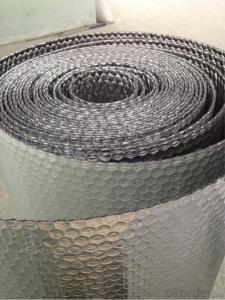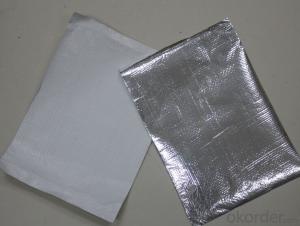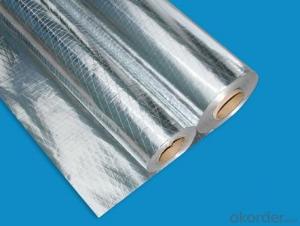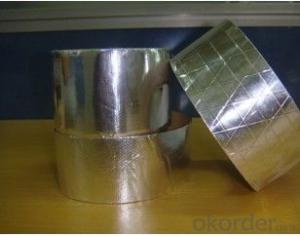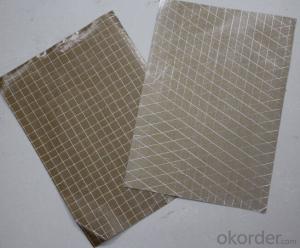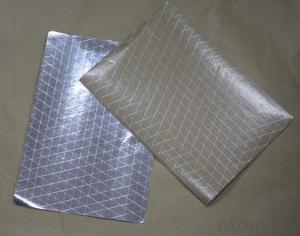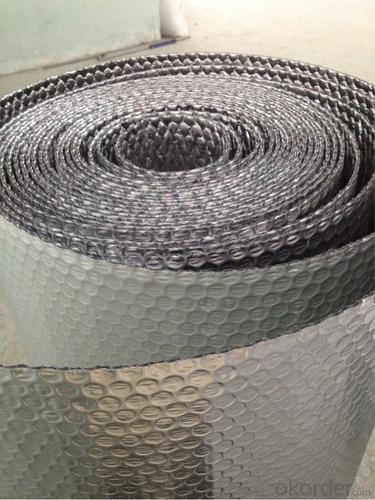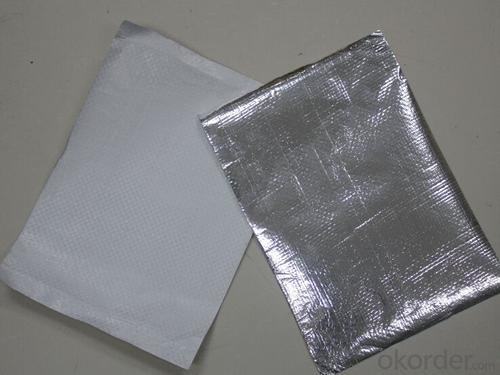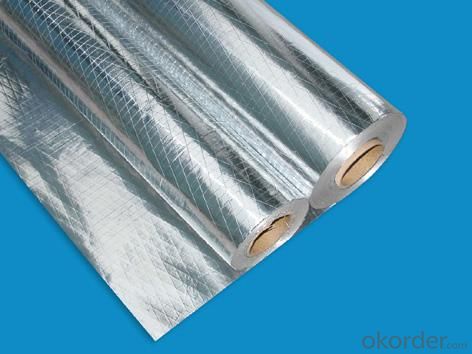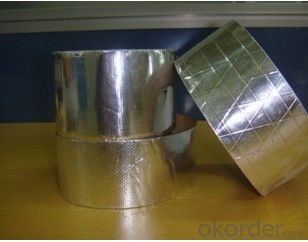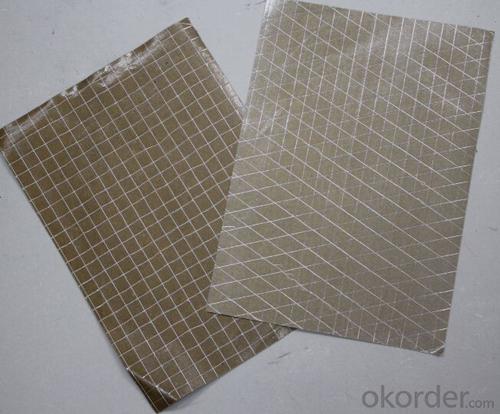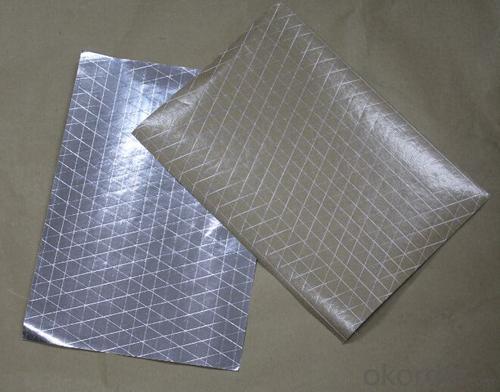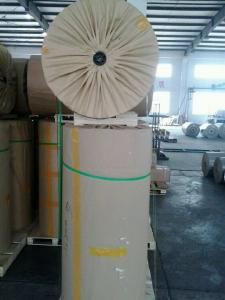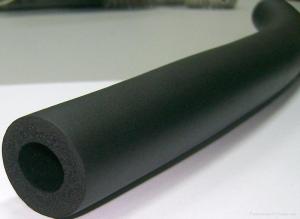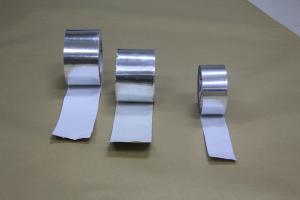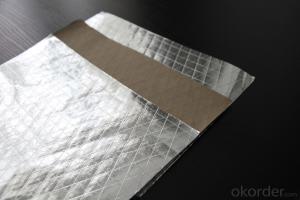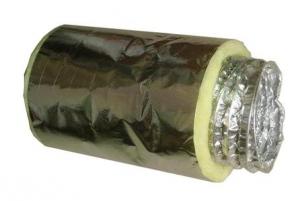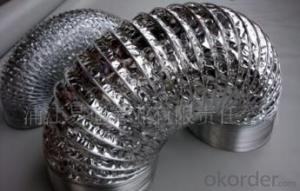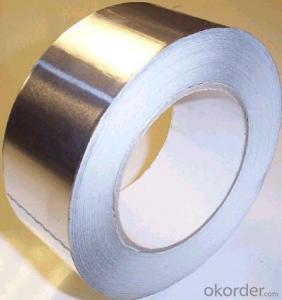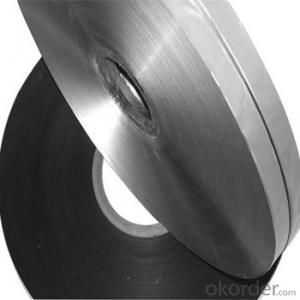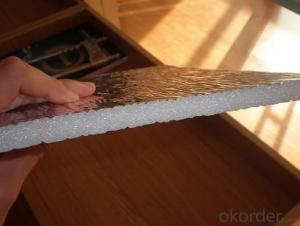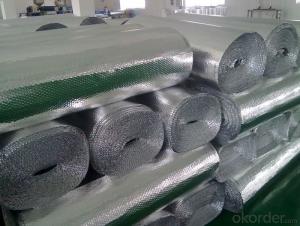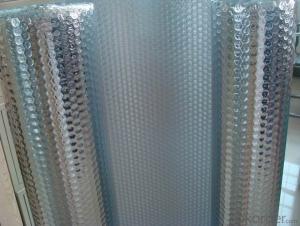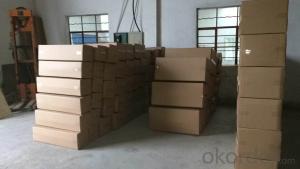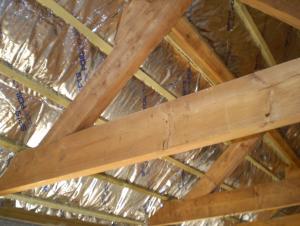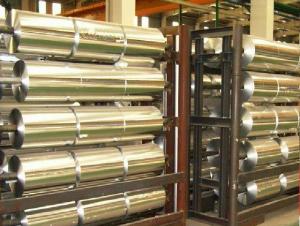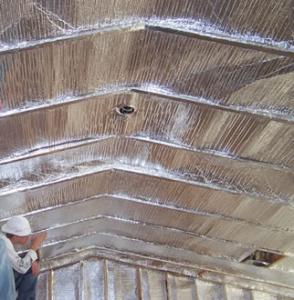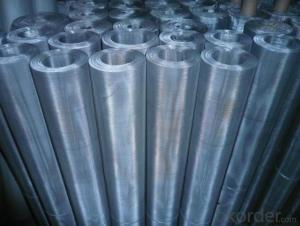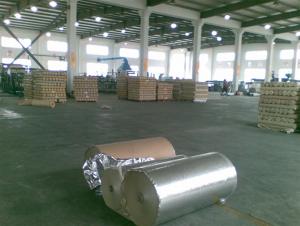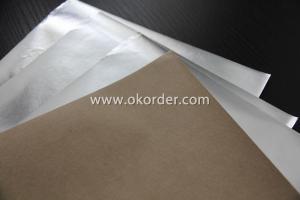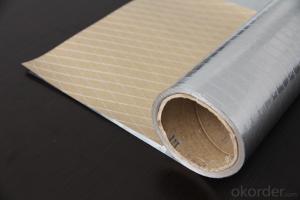Aluminum Foil Facing Insulation Flexible Ducts Bubble Foil AL+LDPE Mylar Film for Heat Seal AL+PET
- Loading Port:
- Tianjin
- Payment Terms:
- TT OR LC
- Min Order Qty:
- 112 m²
- Supply Capability:
- 30000 m²/month
OKorder Service Pledge
OKorder Financial Service
You Might Also Like
).Raw material for Aluminium: 1235-0, 8011
Raw material for PET: New PET ,OPP is also available
2).Different kinds:
| structure | Normal laminated thickness | Width | Length | Color | ID | OD | Packin |
| AL+PET+LDPE | 7umAlu+15umPet+3umGlue | 6mm-1000mm as your required | 500m-7000m | Silver blue bronze black others | 2"or3" | 250mm-600mm | polybag caron pallet
|
| 9umAlu+12umPet+3umGlue | |||||||
| AL+PET+AL | 6umAlu+15umPet+6umAlu+6umGlue | ||||||
| PET+AL+PET | 15umPet+7umAlu+15umPet | ||||||
| AL+PET+EAA | 7umAL+15umPET+25umEAA+6umglue | ||||||
| AL+PET+AL+EAA | 7umAlu+15umPET+7umAlu+25umEAA+9umglue | ||||||
| PET+PET | 15umPet+15umPet +3umGlue | ||||||
| Polyester Tape | 15um,18um |
3).Certificaton: SGS
4).Specifications:
The following is the single side aluminium mylar tape specifications for you take reference:
Description: Al+PET Tape(AL/myler Tape) | ||||
Composition:aluminium foil and polyester film | ||||
Structure | Thickness(um) | Proportion(g/m2) | Elongation(%) | Strength(N/15mm) |
6um AL/12um PET | 20 | 36 | 30 | 2.7 |
7um AL/15um PET | 25 | 43 | 35 | 2.7 |
7um AL/20um PET | 30 | 50 | 35 | 3 |
9um AL/12um PET | 25 | 45 | 30 | 2.7 |
9um AL/15um PET | 30 | 49 | 35 | 3 |
9um AL/20um PET | 35 | 55 | 35 | 3 |
9um AL/25um PET | 38 | 62 | 35 | 4 |
12um AL/12um PET | 25 | 53 | 20 | 2 |
12um AL/15um PET | 30 | 57 | 20 | 3 |
12um AL/20um PET | 35 | 63 | 30 | 4 |
15um AL/15um PET | 30 | 65 | 20 | 3 |
25um AL/15um PET | 45 | 92 | 20 | 3 |
30um AL/25um PET | 60 | 119 | 20 | 3 |
30um AL/30um PET | 65 | 126 | 20 | 5 |
40um AL/30um PET | 75 | 153 | 20 | 5 |
40um AL/38um PET | 80 | 163 | 20 | 5 |
50um AL/25um PET | 90 | 173 | 20 | 5 |
50um AL/50um PET | 100 | 207 | 35 | 6 |
Above values refer to our current production and must be intended as average values | ||||
The reference is not including all specification. | ||||
- Q: What are the potential health advantages of utilizing recycled aluminum items for cooking or baking purposes?
- <p>Using recycled aluminum products for cooking or baking can have some health benefits. Recycled aluminum is generally considered safe as it undergoes a thorough purification process to remove any contaminants. It is also more environmentally friendly, reducing the need for mining new aluminum, which can have negative health impacts due to the chemicals used in the extraction process. Additionally, recycled aluminum products can be more cost-effective, making them accessible to a wider range of consumers. However, it's important to ensure that the recycled aluminum products are from reputable sources and meet safety standards to avoid any potential health risks.</p>
- Q: Is it safe to use old aluminum foil facing as a cutting surface for vegetables and fruits?
- <p>Using old aluminum foil facing as a cutting board is not recommended. Aluminum foil is not designed to withstand the sharp edges of knives and can easily tear or puncture, posing a risk of injury. Additionally, the foil can transfer aluminum particles to the food, which may not be safe for consumption. Instead, use a proper cutting board made from materials like wood, plastic, or bamboo that are designed to handle knives and protect both your food and your safety.</p>
- Q: Is it safe and effective to use aluminum foil facing material for wrapping rice for storage purposes?
- <p>Using aluminum foil facing to wrap rice for storage is not recommended. Aluminum foil facing is not designed for food contact and may contain chemicals that could contaminate the rice. Instead, opt for food-grade materials like plastic bags or containers specifically designed for food storage. These materials are safer and help maintain the freshness and quality of the rice.</p>
- Q: What distinguishes aluminum foil facing from other types of foils?
- <p>Aluminum foil facing is characterized by its aluminum layer, which provides excellent heat and light reflection, making it ideal for insulation and cooking applications. It's also resistant to corrosion and has a shiny finish. In contrast, other types of foils like Mylar (polyester) are more flexible and tear-resistant, used in various industrial applications. Copper foil is used for electronics due to its high conductivity, while gold foil is valued for its decorative properties. Each type of foil has unique properties that make it suitable for specific uses, with aluminum foil facing being particularly known for its thermal and reflective qualities.</p>
- Q: Is it safe to use aluminum foil with a recycled material facing when baking food?
- <p>Using recycled aluminum foil facing for baking is generally safe, as long as it meets food-grade standards and is specifically designed for cooking applications. Recycled aluminum foil used in cooking should be free from harmful chemicals and should not release any toxic substances when heated. However, it's crucial to check the packaging to ensure it is labeled as 'oven-safe' and 'food-grade.' Avoid using foil that is not intended for cooking, as it may contain additives or coatings that are not safe at high temperatures. Always follow the manufacturer's guidelines for safe use.</p>
- Q: Can aluminum foil be utilized as a facing material for cooking in a microwave oven?
- <p>Aluminum foil facing should not be used for microwave cooking. Microwaves can cause the foil to heat up and potentially create sparks or even start a fire. It can also reflect microwaves, damaging the microwave's interior and potentially the oven itself. Always use microwave-safe materials, such as glass or microwave-safe plastic containers, for cooking in a microwave.</p>
- Q: This question asks for a method to clean aluminum foil after cooking to get rid of excess oil.
- <p>To remove excess oil from aluminum foil after cooking, first let the foil cool down to avoid burns. Then, you can use a paper towel or a clean cloth to gently wipe away the oil. For stubborn oil, you can wash the foil with warm soapy water. If you're reusing the foil, make sure it's thoroughly dried before storing to prevent any potential for bacterial growth. Always remember to handle aluminum foil with care as it can be sharp and may tear easily.</p>
- Q: This question asks for the method of wrapping food using aluminum foil.
- <p>To wrap food with aluminum foil, first clean your hands and ensure the foil is shiny side out. Cut a piece of foil large enough to cover the food completely. Place the food in the center of the foil. Bring the edges of the foil together over the food, then fold and crimp the edges to seal tightly. Ensure there are no gaps to prevent the food from drying out or the foil from tearing. For more complex shapes, you can double the foil and create a pouch or tent, folding the edges to secure the shape. Always handle food with clean hands to maintain hygiene.</p>
- Q: Is it safe to use aluminum foil with a reflective side for food storage?
- <p>Yes, aluminum foil facing can be used for storing food. It is commonly used to wrap, cover, or store food in the refrigerator or freezer to keep it fresh. The aluminum foil creates a barrier that helps to retain moisture and prevent freezer burn. It also protects food from odors and can be used for cooking or reheating in the oven. However, it's important to ensure that the foil does not come into direct contact with acidic or high-sugar foods, as this can lead to a reaction that may cause the aluminum to leach into the food.</p>
- Q: Is it possible to recycle aluminum foil with a plastic facing in various countries?
- <p>Recycling practices for aluminum foil with plastic facing vary by country. In some regions, such as parts of Europe and North America, recycling facilities may accept and separate aluminum foil from its plastic lining. However, in other countries, this type of material might not be recyclable due to the difficulty in separating the aluminum from the plastic. It's essential to check local recycling guidelines, as the ability to recycle aluminum foil with plastic facing largely depends on the infrastructure and capabilities of local recycling centers.</p>
Send your message to us
Aluminum Foil Facing Insulation Flexible Ducts Bubble Foil AL+LDPE Mylar Film for Heat Seal AL+PET
- Loading Port:
- Tianjin
- Payment Terms:
- TT OR LC
- Min Order Qty:
- 112 m²
- Supply Capability:
- 30000 m²/month
OKorder Service Pledge
OKorder Financial Service
Similar products
Hot products
Hot Searches
Related keywords
